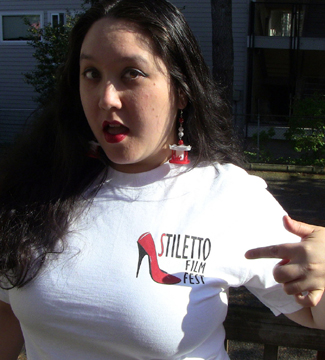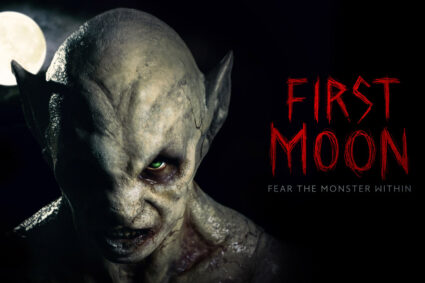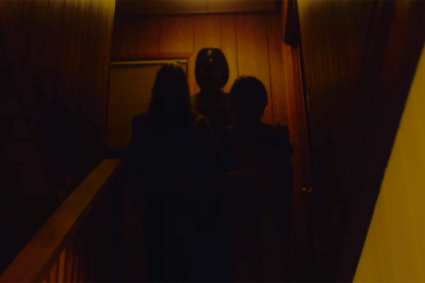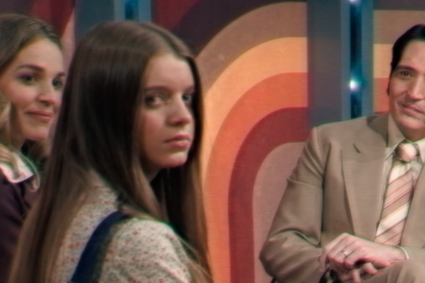
Known as the Emerald City, Seattle, Washington couldn’t be a more appropriate home for a filmmaker with Tonjia Atomic’s sensibilities. Ms. Atomic unleashed her abstract fantasy aesthetic with the dark and surreal fairytale short, COMPANION, as well as the absurdist silent short AWESOME OUIJA BOARD, but her artistic endeavors don’t stop at filmmaking. She also performs in multiple bands, she designs jewelry, and she studies Jeet Kune Do, the Martial Art founded by another one-time Seattle resident – the late, great Bruce Lee.
Much like Dorothy Gale upon her arrival in Oz, Tonjia Atomic was stunned at first to be embraced by the odd inhabitants of the strange artistic territory she was exploring – the horror genre. Unaware she’d been making horror films, Atomic quickly embraced the genre and forged ahead. Her latest movie project, RAW MEAT, is sure to leave the biggest impact on the horror community yet.
Currently in preproduction, RAW MEAT is an ‘80s-style supernatural slasher flick featuring a skinless murderer wreaking havoc on lovers everywhere. Fortunately for us, Atomic is attempting to up the ante this time out with a bigger budget and subsequently better production values.
Ravenous Monster recently caught up with the Emerald City’s whirling dervish of the arts and got the goods on RAW MEAT, projects past, and what makes Tonjia Atomic tick. Read on, Horror Fans, lest you be besieged by flying monkeys….
RavMon: You’re a writer, a director, an actress, an artist, and a musician among many other roles. Which of these pursuits are you most passionate about?
Tonjia Atomic: Music is my greatest passion emotionally, but filmmaking is very fulfilling in many ways. I like many different roles as far as filmmaking is concerned which can include writing, acting, and even music. So, even though music is my greatest passion I find myself putting more energy into filmmaking. I try to balance all of my interests, but that can be difficult.
RavMon: Two of your short films, AWESOME OUIJA BOARD and COMPANION, are tonally very different from one another, despite sharing some aesthetic similarities. Do you have what you consider to be “your” style as a filmmaker, a home base if you will?
TA: I approach every project differently. I try to create an atmosphere that is fitting to the story. My filmmaking hero, John Sayles, has made many different types of movies in many genres. The strengths and commonalities in all of his movies are interesting and meaningful characters and a psychological truth throughout his stories. I find psychological truth a very important factor in my own filmmaking. Even if I’m making a fantasy or comedy the metaphors have to stand for something real and the comedy has to have a connection to humanity or for me it falls flat. As far as themes, visual patterns, composition, etc. I’m not sure yet. I feel like I haven’t made enough films to fully warrant and answer.
RavMon: Tell us about your current film, RAW MEAT.
TA: I’m fundraising for a short film call Raw Meat about a killer who was skinned, left for dead, and spurned by his true love. He now hates love and all people in love. I mentioned the idea to my friend Bill Oberst Jr. It sparked the idea for the short film where Meat Head, the killer, is stalking his ex-fiancé on her wedding day. We would like to start working on a feature idea after the short is made.
RavMon: You’ve cut your teeth making micro-budgeted indie fare. However, you’ve stated that you’re looking for RAW MEAT to be a bit higher-octane with regard to production values and concept. In that regard, it would seem that this project is a departure from your past works regarding your production approach as well as stylistically. Why?
TA: I’m done with micro and no-budget. For Raw Meat, the FX alone will cost many times more what some of my full projects have cost. Bill and I both find it important for this to look right, not just the characters but also the lighting, set, and picture. The sound quality also must be good. It’s such an outrageous premise that it has to have a high production value. If we skimp on any of that it will turn into camp.
RavMon: You’re fundraising for RAW MEAT via IndieGoGo.com. How’s your experience been so far? What are its strengths? Are there things about fan-sourced fundraising that you’d change to make it better?
TA: We still have some time on the campaign but there is a long way to go. The hardest part is spreading the word. We seem to get more backers when I post on twitter and Facebook about the campaign. However, I don’t want to annoy all of my friends by constantly posting about it. It is kind of what you must do, that has been difficult. I feel like there’s a lot of burnout right now from social media users getting constantly barraged with crowd-funding campaigns but I’m not sure what the answer is.
RavMon: Do you have a formal background in filmmaking?
TA: I do. I have an AAS in video and film production from Seattle Central Community College. I made my first short film on 16mm right around the time I graduated. I’ve had experience on small, medium, and large projects. Some of those have been great and some difficult. I have learned from all of them.

RavMon: What compelled the young Tonjia Atomic down the inevitable path toward storytelling?
TA: I’ve always loved stories whether it be books, movies, television, radio, or music. My parents are very artistic and appreciate the arts. I grew up reading and being read to, watching a lot of television and movies, going to the library, etc. When I was four I had my own radio and record player in my room. I was exposed to the arts at a young age and just ate it up. It was a natural enjoyment for me and one that was easily accessible.
RavMon: Which storytellers, regardless of medium or genre, inform your work the most? Which specific works?
TA: I love folk tales and fairy tales. I love the stories that have been passed down verbally and eventually recorded as well as authors such as Hans Christian Anderson. I also love stories with a real human emotional element. I mentioned John Sayles earlier and I also love Ingmar Bergman and Francois Truffaut. I love surrealist art and the films of Jean Cocteau, and David Cronenberg. I also love humor and camp like John Waters. Artists that can mix these things like Salvidor Dali, Roman Polanski, David Lynch and Bong Joon-ho are my favorites. I can’t really mention specific works that directly influence my work because my work draws from a myriad of artists and art pieces in many different ways. I wouldn’t be who I am today if I didn’t have the desire to seek out and absorb as much as possible.
RavMon: Is the Seattle filmmaking community supportive of genre fare?
TA: There have been a few cool genre films made in Seattle in the last few years. There hasn’t been a huge amount though. There are filmmakers that live and work out of Seattle and some places that have resources such as the North West Film Forum. However there is not a remarkably large filmmaking community let alone genre community by any means. I think it’s pretty tough to make a movie wherever you are. It does seem like there are a lot of zombie lovers in Seattle though!
RavMon: Why horror?
TA: Horror is a huge umbrella that covers many aspects of storytelling. Because I wasn’t making slasher style films I didn’t really realize that I was doing horror. A friend of mine told me that COMPANION was scary and I thought, “Really?” I love it though. I’ve loved horror stories and films as long as I can remember, starting film-wise with SOMETHING WICKED THIS WAY COMES and THE WATCHER IN THE WOODS. Both movies were staples at sleepovers. It’s only recently that I’ve been primarily submitting to horror fests and becoming friends with other genre filmmakers and actors. What I’m beginning to understand is just how generous the horror community is and how supportive and close knit it is. I feel very lucky. I also feel like I fit in and can relate with the people that I’ve met in very fundamental ways.
RavMon: Do you have career goals as a filmmaker or is it merely one facet of your overall artistic output? In other words, is the independent film scene your means to a larger end or does it just happen to be one of the creative territories in which you’re most comfortable?
TA: I love filmmaking and found early on that I took to it. I pretty much want to do it just to do it. I do feel the responsibility to become successful enough to pay the cast and crew going rates. I feel like it is only right to compensate people accordingly for helping me to fulfill my goals. My overall goal is just to keep making the projects that I want to the way that I want to.
RavMon: Tell us about your jewelry.
TA: I started making jewelry by converting toys and miniatures into earrings. I’ve always loved fashion and jewelry. I see it as an extension of self expression and creativity. I still use toys and miniatures but have also branched out to semi-precious materials, vintage looking metals, and flower cabochons. I also have a horror line. If I had the opportunity I would love to design other accessories like purses and shoes. I’m thinking about creating a line of jewelry for men. You can find my stuff at www.hotchickphysics.com and www.etsy.com/shop/pussycat.
RavMon: You’re also involved with several projects that aren’t horror-related such as the film DANCING IN ISOLATION and the web series THE PROSAIC LIFE OF STASHA AND ADA. Tell us a bit about those.
TA: DANCING IN ISOLATION is a play and screenplay written by Aiden Karamanyan that I directed. It is the story of a trans woman and her experiences with relationships — one in particular. There is a mid length finished film, and we are talking about fleshing it out a bit to make it into a longer feature. THE PROSAIC LIFE OF STASHA AND ADA is a comedy web series written by me and Aiden Karamanyan. Needless to say, we work well together. The series is about two girls who have mediocre talents who are trying to make it big as artists. We’re filming the second season now. After the second season there is a companion feature piece called WALKING TO LINAS. You can find the show here www.youtube.com/stashaandada.
RavMon: As a director, describe for us Tonjia Atomic’s dream movie — any cast and crew (dead or alive), any genre, any era, etc.
TA: That is a tough question. Because I look at each film differently and there is so much I want to do it is difficult to answer. I know that I would love to work with John Sayles somehow. I would learn so much from him. Sam Rockwell is an amazing actor and I would pick him as a dream actor to work with. I feel the same way about Gillian Anderson and Boris Karloff. Michael Berryman and Barbara Crampton are two actors who I love and who I think are underrated. I am in a very fortunate place right now to say that I am working with some people who are dream come true amazing artists to work with. People like Barbara Peeters, Bill Oberst Jr., Joe Sherlock, Derrick Carey, and Andrew Shearer are all people that I’m working with now and I love and admire them all. I hope to sometime work with Dayna Noffke, Nadine L’Eperance, Jen and Sylvia Soska, Jessica Gallant, Gregory Blair, and Katie Carmen just to name a few contemporary filmmakers. I could go on, but this would get way too long.
RavMon: How can Ravenous Monster Readers keep posted on your work?
TA: I can be found at www.tonjiaatomic.com, www.rawmeatmovie.com, www.indiegogo.com/rawmeat, www.facebook.com/tonjiaatomic, and www.twitter.com/tonjiaatomic.
2 thoughts on “Interview with Filmmaker Tonjia Atomic”
Comments are closed.















Tonjia Atomic is one of my favorite people.Very talented and has a lot to offer.She ROCKS!!Great article on her,I love it!
Thanks for reading, Nadine!